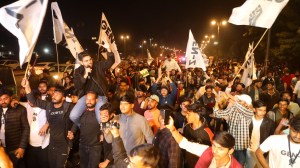Osama joins fray
8220;O American people, I am speaking to tell you about the ideal way to avoid another Manhattan, about war and its causes and results... D...

8220;O American people, I am speaking to tell you about the ideal way to avoid another Manhattan, about war and its causes and results8230; Despite entering the fourth year after September 11, Bush is still deceiving you and hiding the truth from you and therefore the reasons are still there to repeat what happened8221;
After the briefest pause in hostilities, aides to President Bush and Sen John F. Kerry seized on the re-emergence of terrorist leader Osama bin Laden on Friday to launch a fierce round of attacks 8212; each accusing the other of exploiting the matter for political gain.
8216;8216;You would think there would be maybe 12 hours to let the American people absorb this,8216;8216; said Dan Bartlett, the White House communications director, after Kerry reiterated his criticism of Bush for failing to capture bin Laden in the mountains of Afghanistan in the months following 9/11. 8216;8216;It8217;s offensive and shameful for this president to play politics the way he did today with this issue,8217;8217; retorted Joe Lockhart, a senior Kerry strategist, after Bush assailed his Democratic rival for his remarks.
The exchange underscored the uncertainty introduced into the White House race by bin Laden8217;s tape and the scramble to capitalise on it 8212; or contain any potential political harm it might cause. For all the anticipation of a last-minute campaign surprise, both sides appeared flummoxed at first when bin Laden intruded on an otherwise routine, if intense, campaign day.
Republicans saw the bin Laden tape helping Bush and hurting Kerry. Democrats, less assuredly, suggested the opposite. More neutral observers said the effect of the tape depended on how voters process the news.
Most analysts felt it would aid Bush, at the least, by changing the subject from stolen Iraqi weapons, doctored campaign ads and other developments that had thrown the President on the defensive. 8216;8216;We8217;ll have to see whether it completely displaces the 300 tons of weapons missing from the bunker in Iraq,8217;8217; said Garry South, a Democratic strategist unaffiliated with the Kerry campaign.
Others suggested that opinions are so firmly fixed at this stage that the resurfacing of bin Laden may not significantly change the dynamic. 8216;8216;We have become so divided in terms of partisanship that each side will read what they want into bin Laden8217;s statement,8217;8217; said political scientist Peverill Squire, University of Iowa. 8216;8216;What Republicans are thinking is, this puts the focus back on terrorism,8217;8217; Squire said. 8216;8216;And the people supporting Kerry say this shows bin Laden is alive. Each side will see it the way they want to see it.8217;8217;
Kerry8217;s response to the tape evolved as the hours passed. He stressed that the country is 8216;8216;united in our determination to hunt down and kill the terrorists.8217;8217; But he also reiterated a frequent criticism that the President let bin Laden get away. 8216;8216;I regret that when George Bush had the opportunity in Afghanistan and Tora Bora, he didn8217;t choose to use American forces to hunt down and kill Osama bin Laden,8216;8216; Kerry said.
The President8217;s approach also changed as the day wore on, in reverse fashion from Kerry8217;s. At first, he was statesmanlike. But the tone soon shifted. 8216;8216;My opponent continues to say things he knows are not true.8217;8217; 8212; LAT-WP
|
TERRORSPEAK
|
||||
| nbsp; |
8220;It never occurred to us that the commander in chief of the American forces Bush would leave 50,000 citizens in the two towers to face those horrors alone at a time when they most needed him because he thought listening to a child discussing her goat and its ramming was more important than the planes and their ramming of the skyscrapers. This had given us three times the time needed to carry out the operations, thanks be to God8230; Your security is not in the hands of Kerry or Bush or al Qaeda. Your security is in your own hands, and each state which does not harm our security will remain safe.8221; |
nbsp; | ||
- 01
- 02
- 03
- 04
- 05































